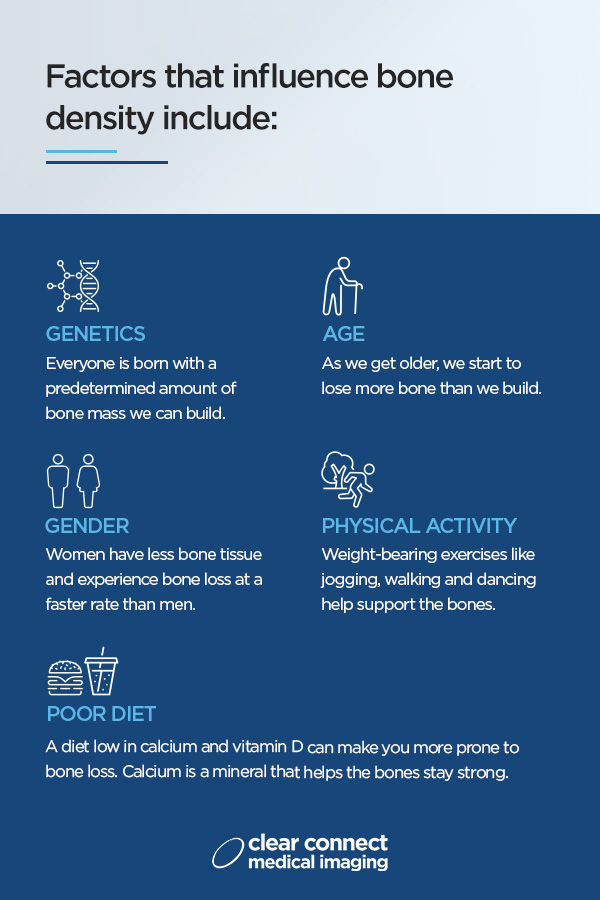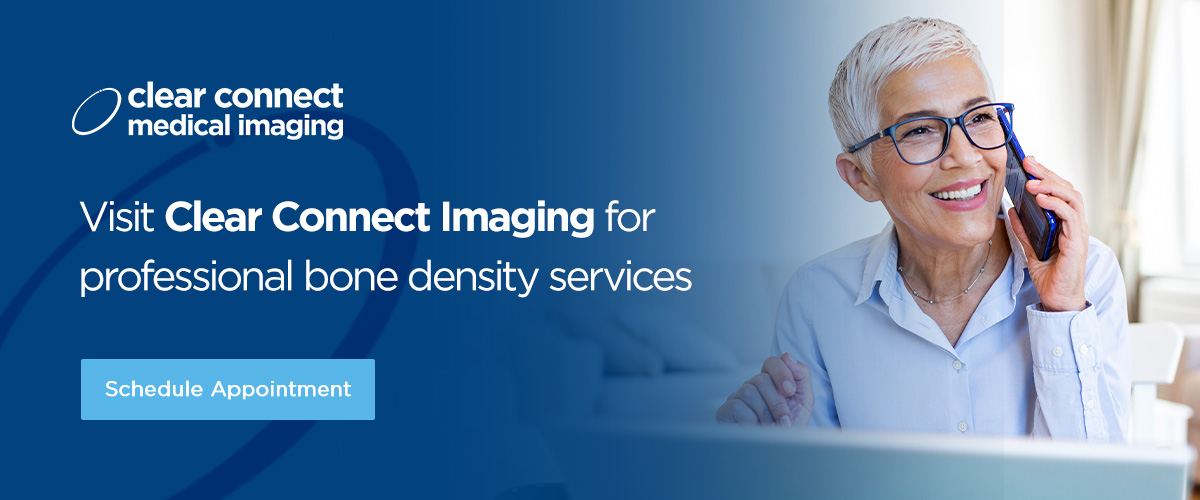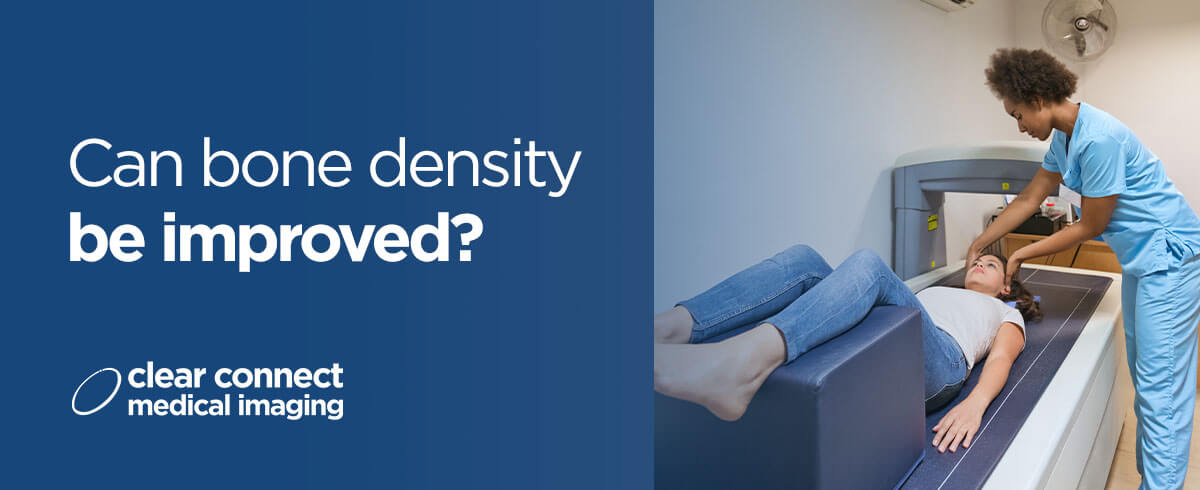
Contrary to popular belief, our bones are not solid. In fact, a bone’s interior consists of tiny holes that keep it light and springy. As we age, our bones naturally lose mineral density, changing their composition, structure and function. This can lead to diseases like osteoporosis, which makes you more susceptible to bone breaks and fractures.
Thankfully, you can improve bone density through lifestyle changes like exercise, dietary choices and weight management, among many others. Learn more about bone density loss, risk factors and changes you can make to strengthen your bones.
Jump Ahead:
How to determine bone density
A bone density test measures the minerals within your bones and their overall density. The test can determine if you have osteoporosis by measuring the grams of calcium and other bone minerals packed into a small segment of bone, such as the hip, spine or forearm. It can be done through x-rays, a specialized CT scan or dual-energy x-ray absorptiometry (DEXA or DXA).
You might consider a bone density test if you have:
- Lost height, which is likely due to compression fractures in the spine due to osteoporosis.
- Taken certain drugs like prednisone, which interferes with bone-rebuilding.
- Fractured a bone due to increased fragility.
- Had a drop in hormone levels from menopause or certain cancer treatments.
Bone density tests are quick and painless, usually taking 10 to 30 minutes to complete. As the machine slowly passes over you, the image of your bone will be generated on a computer monitor. If the test determines you have a high bone mineral content, your bones are dense and less likely to break. A low bone mineral content result indicates you’re at risk of fractures or having osteoporosis.
Test results are reported as a T-score number, or a number of units — called standard deviations — signifying whether your bone density is above or below the average of a healthy person your age. For instance, a T-score of -1 and above is considered normal, -1 to -2.5 is a sign of osteopenia, and -2.5 and below indicates osteoporosis.
How to improve bone density
While bone density loss is common as we age, there’s a lot you can do to protect your bones even later in life.
1. Eat the right foods
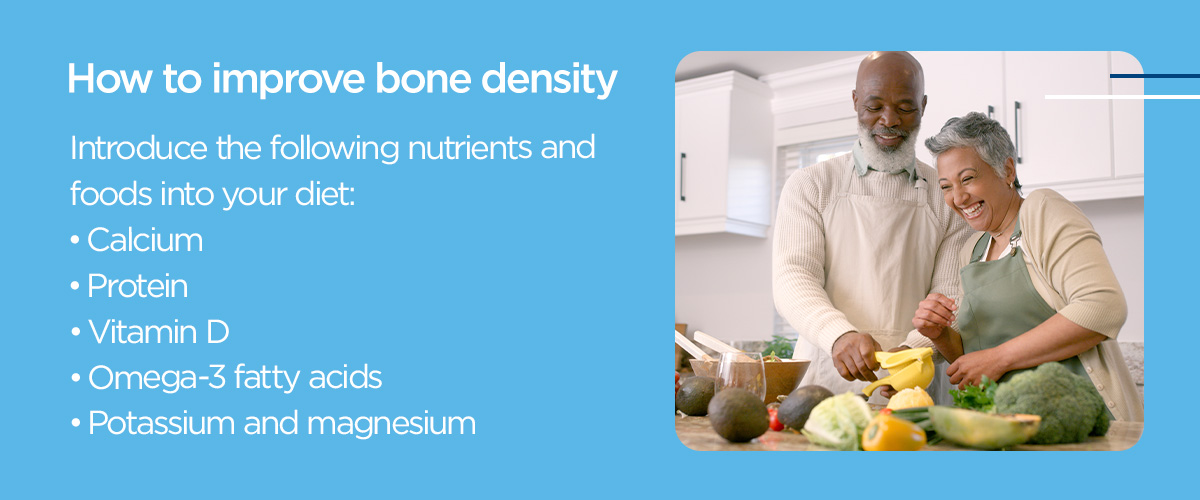
Eating the right foods can slow bone loss. Vegetables, fruits, whole grains, nuts and fish are all high in protein, calcium and micronutrients like vitamin K and magnesium — all of which are essential for maintaining bone health. Introduce the following nutrients and foods into your diet:
- Calcium: While the United States lists the minimum daily calcium requirement at 1,200 milligrams for women over 50 and men over 70, the recommendation outside the U.S. is much lower. The World Health Organization (WHO) recommends getting between 500 and 700 milligrams of calcium, and the best way to get it is through food. Skim milk, low-fat plain yogurt, salmon and orange juice are all great sources of of calcium.
- Protein: Foods high in protein aid bone repair and rebuilding. Bone is 35% protein, so by eating enough foods high in protein, you can increase muscle mass and, ultimately, bone mass.
- Vitamin D: Salmon and fatty fish offer bone-boosing nutrients like vitamin D. One of the best ways to get this nutrient is through canned salmon — just three ounces has 11.6 micrograms of vitamin D. This is about 77% of the total daily recommended amount of vitamin D for people 1-70 and 58% for people older than 70.
- Omega-3 fatty acids: Salmon, flaxseed, chia seeds, walnuts and edamame are rich in this bone-boosting nutrient.
- Potassium and magnesium: Try to eat fruits and vegetables high in potassium, like bananas, spinach and sweet potatoes. You can get more magnesium by eating foods like seeds, whole grains, nuts and dried beans. Both nutrients can contribute to better bone density.
2. Get active
One study found that people over 65 who were physically active were less likely to be injured than those who did not. Weightlifting and strength training are especially beneficial for bone health and reducing injury, as these methods of training can promote new bone growth while protecting existing bone structure. By stressing the bones, strength training can help you improve your bone density while reducing the risk of osteoporosis. It also helps protect the joints from injury, contributing to better balance and fewer falls. Other benefits of weight and strength training include:
- Increased bone mineral density.
- Increased bone size.
- Reduced inflammation.
- Protection from bone loss.
- Increased muscle mass.
Strength training exercises challenge the muscles as you work against some type of resistance device, including elastic bands, dumbbells or your own weight. If you don’t have the equipment, you can try exercises like pushups, pullups, lunges, planks and squats to promote better bone health.
Weight-bearing exercises like running, walking, hiking, dancing, playing basketball, golfing or climbing stairs can also be effective. These activities cause you to exert force to counteract gravity — stimulating the bones to get stronger.
3. Work on balance
Be mindful of your balance. People over the age of 55 with balance issues are at an increased risk of fractures due to an increased risk of falling. You can check your balance with a self-test that includes placing your foot so that one toe touches the other heel. If you cannot stand in this position for 10 seconds, you’re at a higher risk of falling. You can contact a healthcare provider to discuss the potential underlying causes of balance issues.
Adding balance exercises into your routine can help prevent falls and protect your bones from fractures or breaks. The following activities can promote coordination and balance:
- Tai chi
- Weight shifts
- Single leg balances
- Chair leg raises
- Side-stepping
- Planks on a stability ball
Physical therapy can also help strengthen the muscles, improve balance, prevent injuries and promote independence. Additionally, older adults should receive regular vision checks, as some age-related diseases, like cataracts, can affect sight and balance.
4. Try supplements
If you’re not getting enough vitamins and minerals through your diet, your healthcare provider might suggest taking supplements to improve bone health. These might include:
- Calcium: Calcium carbonate and calcium citrate are common vitamins shown to improve bone density. Healthcare professionals will likely recommend that you take under 600 milligrams a day of calcium in supplement form. Any higher amounts should be taken in separate doses, preferably with meals. Calcium can delay the absorption of vital nutrients like iron, so you’ll want to speak with a healthcare professional before taking any supplements.
- Vitamin D: It can be challenging to get vitamin D from food alone, which is why many people take supplements. The recommended daily amount of vitamin D is 15 micrograms for adults 19-70 and 20 micrograms for adults 71 and over. Getting enough vitamin D is essential to ensure the bones absorb calcium. Unlike calcium supplements, you can take vitamin D supplements with or without food and at one time.
- Vitamin C: Consuming appropriate amounts of vitamin C has a beneficial effect on bone metabolism, which is the process of mature bone tissue being removed from the skeleton while new tissue is formed.
5. Stop smoking
Another lifestyle change involves giving up smoking. Smoking and nicotine pose bone-related risks. Smoking inhibits the absorption of calcium in the body, which can lead to weakened bones and lower bone density. It also breaks down estrogen quickly, which is a necessary hormone for building and maintaining healthy bones. Nicotine slows the production of cells that build bones and aid in healing.
6. Limit alcohol consumption
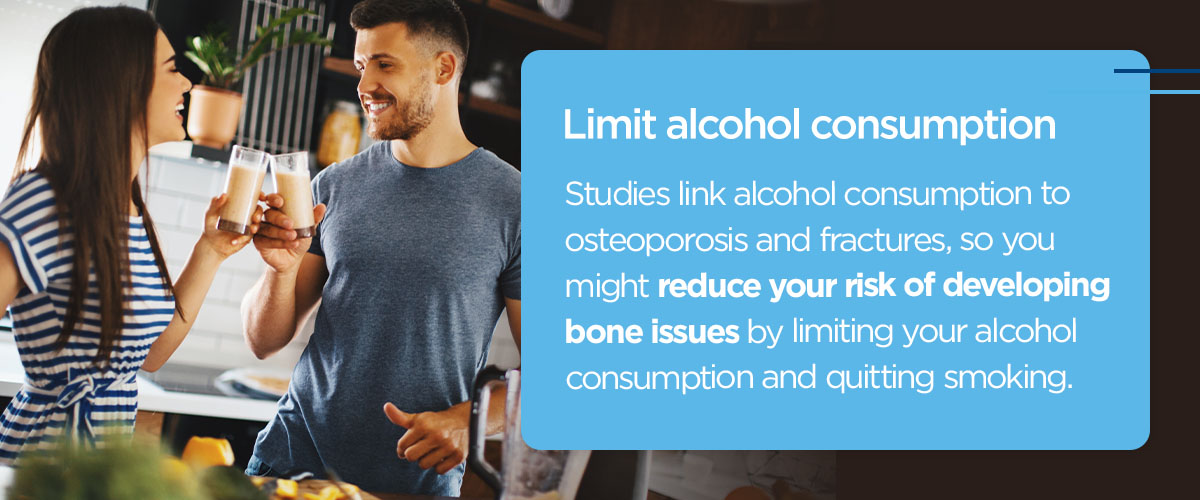
Drinking alcohol in moderation, if at all, is important for bone health. Studies link alcohol consumption to osteoporosis and fractures, so you might reduce your risk of developing bone issues by limiting your alcohol consumption and quitting smoking. If you’re having trouble limiting use, speak with your healthcare provider about how to manage alcohol consumption levels or alcohol use disorder.
7. Avoid a low-calorie diet
It’s crucial to get enough calories in your diet, as consuming insufficient calories can lead to health problems, including bone density loss. Before dieting, talk to a health provider to determine the number of calories you should consume each day. In addition to consuming enough calories, make sure to get a balance of vitamins, fats, proteins and minerals in your diet.
8. Maintain a healthy body weight
A healthy weight is crucial for bone density. Both being underweight and overweight can pose a risk to bone health:
- Underweight: Individuals who are underweight are at a higher risk of developing bone disease, and lower body weight is associated with low bone mass and an increased risk of fractures. As you lose weight, you lose bone density, which can’t be restored — even if you gain weight again.
- Overweight: Excess weight can put extra stress on the bones. Obesity is also linked to reduced bone turnover. Additionally, conditions that affect people with obesity, such as chronic kidney disease, can cause bone loss and increase the risk of fracture.
If you are trying to reach a healthier weight, aim to do so slowly rather than gaining or losing weight rapidly.
9. Go for regular screenings
The U.S. Preventive Services Task Force (USPSTF) recommends that women receive a baseline screening at age 65. There are currently no recommendations for men, but many men make an appointment at 70, and you can check the USPSTF site for updates. You might go for an earlier screening if you:
- Smoke.
- Have taken steroid medications for a long time.
- Have diseases that increase the risk of osteoporosis, like diabetes or rheumatoid arthritis.
- Have early menopause.
- Have broken a bone after age 50.
If your scan is normal, you won’t need another screening for up to 10 years unless your risk factors don’t change. If you have osteopenia, you should go for a follow-up scan within five years. If you have osteoporosis, you’ll require repeat testing every two years.
Precautions and limitations
You should be aware of different precautions and limitations when looking to improve bone density, especially if you have preexisting or underlying health conditions. Try to follow these guidelines:
- Consult a healthcare professional: Before making lifestyle changes to improve bone density, speak with a healthcare professional. If you have a preexisting condition, professionals will help you implement an exercise or dietary program customized to your needs and medical history.
- Evaluate medications’ impact: Some prescription medications can impact health. If you’re taking medications for chronic conditions, ask your doctor about their impact on bone density and if you should make any adjustments. Also, be aware of the side effects of interventions like hormone replacement therapy, including increased risk of breast cancer, blood clots and stroke.
- Choose suitable exercises: While weight-bearing and strength training exercises can promote better bone health, some activities might not be suitable if you have specific health conditions. Ask your healthcare provider or a trainer to recommend exercises based on your condition. You might also take precautions like using assistive devices if you have trouble with balance.
- Be cautious with supplements: While many supplements can benefit bone health, you’ll want to ask healthcare professionals before taking a new supplement, especially if you have preexisting health conditions. They’ll help you with the right dosages and inform you of potential interactions you could experience with your medications. Side effects of excessive doses of vitamin D or calcium include kidney stones, constipation and impaired kidney function, making it crucial to follow daily recommended intakes.
Visit Clear Connect Imaging for professional bone density services
While we naturally lose bone mass as we get older, there are many preventive measures you can take to promote strong, healthy bones. Just remember to consult with a healthcare provider before implementing dietary or exercise changes to your routine. Stay on top of your bone density by scheduling a bone density scan with Clear Connect Imaging. We are committed to providing high-quality imaging services to the Tallahassee community.
Call us today to schedule your bone density appointment.


